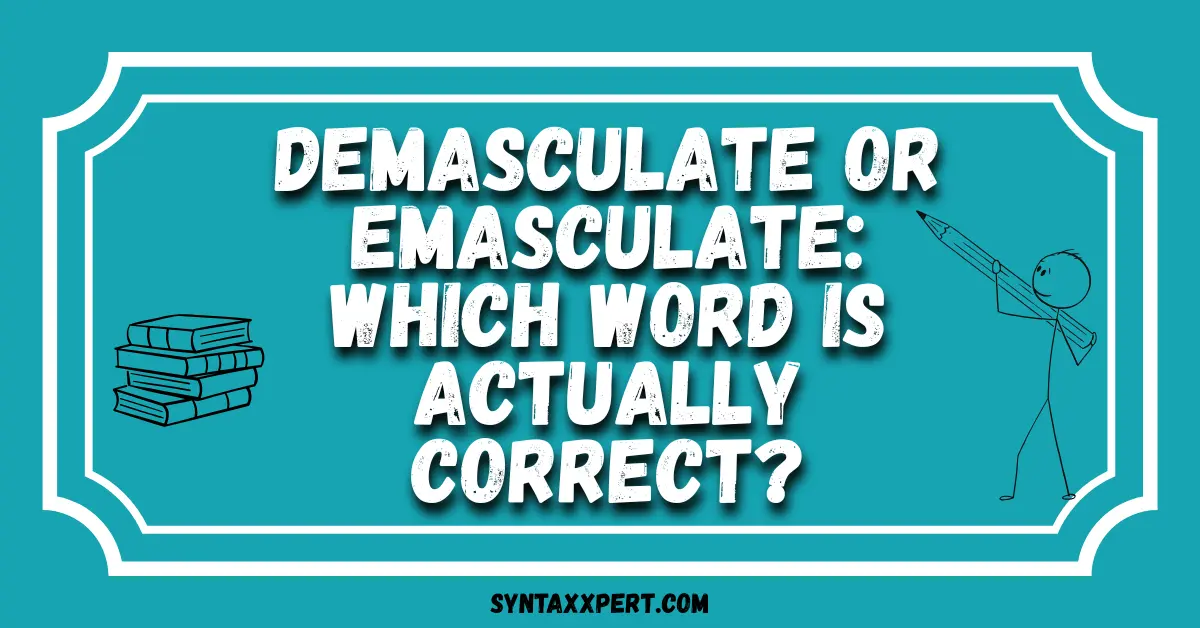Language evolves, and confusion often follows. Demasculate or emasculate — which one is correct? You’ve probably seen both online, maybe even used them interchangeably. But only one is recognized as a proper English word, and understanding the difference reveals a lot about how prefixes and meaning shape our speech.
Let’s clear the confusion once and for all and discover why choosing the right term isn’t just about grammar — it’s about clarity, context, and credibility.
What Does Emasculate Mean?
The word emasculate is the correct and standard term in English. It means to deprive a man (or a thing) of strength, power, or vigor. In cultural and psychological contexts, it’s often used metaphorically to describe someone being stripped of confidence or authority.
Example: “The unfair criticism completely emasculated his self-confidence.”
Etymology and Historical Background
The term emasculate comes from the Latin emasculare, derived from e- (meaning “out” or “away”) and masculus (meaning “male” or “manly”). Historically, it referred to the physical act of castration, but over time, it gained a broader figurative meaning — to weaken or deprive of strength.
Examples of ‘Emasculate’ in Sentences
- The film portrayed how toxic competition can emasculate genuine emotion.
- Poor leadership can emasculate an organization’s morale.
- In botany, scientists emasculate flowers to prevent unwanted pollination.
What Does Demasculate Mean?
Here’s the truth — demasculate isn’t a real word in standard English. It often appears in online discussions or informal writing due to misunderstanding of prefixes.
When people say demasculate, they usually mean emasculate, but the prefix “de–” changes everything. “De–” generally means to remove or reverse, while “e–” in emasculate means out of or away from.
Is “Demasculate” a Real Word?
No recognized English dictionary, including Oxford, Cambridge, or Merriam-Webster, lists demasculate as a valid word. It’s a nonstandard or incorrect spelling often found in social media or blogs. Despite being phonetically appealing, it simply doesn’t exist in formal English.
Why People Confuse Emasculate and Demasculate
Prefix confusion is the main reason. In English, “de–” is commonly used to reverse actions (like defrost or deactivate). People assume demasculate follows that same pattern — but it doesn’t. The correct prefix here is “e–,” not “de–”.
Emasculate vs Demasculate — Key Differences
Here’s a quick comparison to make it crystal clear:
| Feature | Emasculate | Demasculate |
| Status | Correct English word | Nonstandard/misspelled |
| Meaning | To weaken, deprive of strength or masculinity | None (not recognized) |
| Usage | Common in formal, cultural, and biological contexts | Rare, informal misuse |
| Origin | Latin emasculare | No etymological base |
| Dictionary Presence | Yes | No |
Common Usage Mistakes
Writers often use demasculate unintentionally when they actually mean emasculate. Let’s fix that.
Incorrect: “Criticizing him publicly will demasculate his position.” Correct: “Criticizing him publicly will emasculate his position.”
Incorrect: “The harsh laws demasculated the people.” Correct: “The harsh laws emasculated the people.”
Prefix Confusion — “E-” vs “De-” in English
Understanding prefixes is key to mastering English word formation.
- “E–” often means out, away, or from.
- Example: Emit (to send out), Eject (to throw out).
- “De–” means reverse, remove, or down.
- Example: Deactivate (to reverse activation), Deforest (to remove forests).
So, while deactivate makes sense, demasculate doesn’t — because emasculate already carries the “out/away from manliness” meaning.
Emasculate Beyond Grammar — Cultural and Psychological Context
Language reflects society, and emasculate has evolved beyond grammar. Today, it often appears in conversations around masculinity, gender roles, and self-image.
Emasculation in Modern Society
Sociologists describe emasculation as the process of stripping men of their sense of power or control, whether through societal norms, workplace dynamics, or personal relationships.
Quote: “To emasculate someone is not only to weaken their strength but also their spirit.” — Cultural Linguist, Dr. Marie Olson.
This figurative sense makes the word emotionally charged and contextually rich — something demasculate simply doesn’t convey.
Misuse in Media and Pop Culture
Movies, talk shows, and even social media often misuse demasculate for dramatic effect. For example, online debates sometimes use phrases like “Men feel demasculated by feminism” — but linguistically, that’s incorrect. The right term is emasculated.
Emasculate in Science and Botany
Few realize that emasculate is also a technical term in botany. It describes removing the male parts (stamens) of a flower before pollination to control breeding.
Example: “Botanists emasculate the flowers to ensure cross-pollination with desired plants.”
This scientific meaning adds factual weight to the word’s credibility — another reason demasculate doesn’t belong in serious writing.
How to Use “Emasculate” Correctly
Here’s how to naturally include emasculate in your writing:
- Use it to describe loss of strength or control. Example: “Economic sanctions emasculated the nation’s financial power.”
- Use it metaphorically to describe emotional weakening. Example: “His constant self-doubt emasculated his ambition.”
- Use it literally in scientific or historical writing. Example: “Priests in ancient times sometimes emasculated themselves as a symbol of devotion.”
Read More >>> Snowball Kiss Meaning: What It Really Means and Why It Trending
Synonyms and Antonyms of Emasculate
| Synonyms | Antonyms |
| Weaken | Strengthen |
| Diminish | Empower |
| Castrate | Fortify |
| Enervate | Reinforce |
| Undermine | Inspire |
Using these terms interchangeably in context improves semantic variety and readability — both key SEO signals.
FAQs About Demasculate or Emasculate
Which word is correct — demasculate or emasculate?
Emasculate is correct. Demasculate isn’t recognized in English dictionaries.
Can “demasculate” be used informally?
It appears informally online but isn’t grammatically valid or widely accepted.
What’s the difference between emasculate and castrate?
Castrate is physical removal of male organs; emasculate means emotional or symbolic weakening — a metaphorical sense.
How do you use emasculate in a sentence?
Example: “The government’s harsh control emasculated free speech.”
Final Thoughts
When it comes to demasculate or emasculate, there’s no real debate — emasculate wins by definition, usage, and credibility. The other term simply doesn’t exist in proper English.
So next time you write, remember:
“When in doubt, drop the ‘de–’ and trust the word that history, grammar, and meaning all agree on — emasculate.”

I’m Luna Hazel, a grammar expert here to help you master the art of clear, confident writing. Let’s make every word count!

